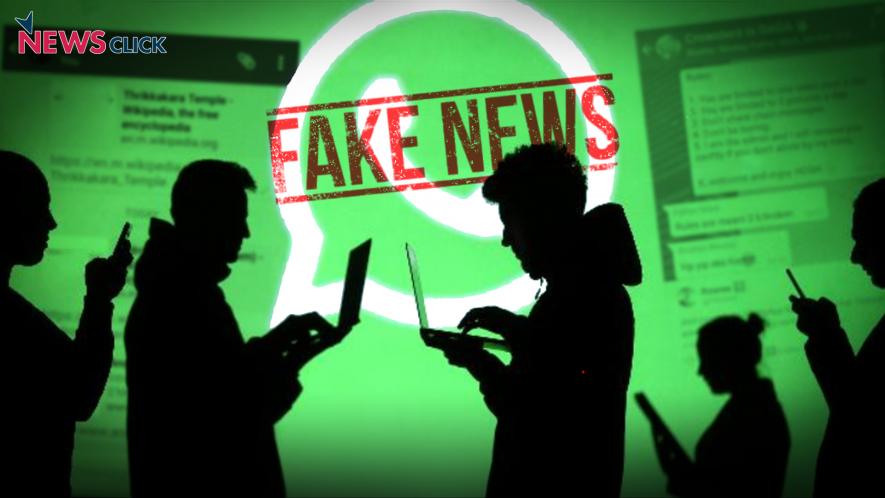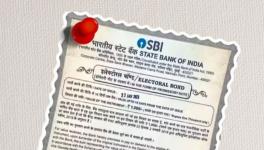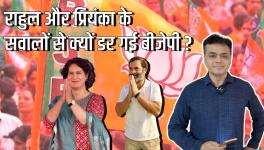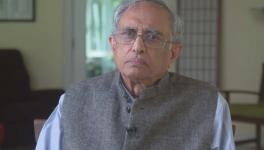‘Patriotism’ Made Easy in Times of ‘WhatsApp Elections’

There was a time when ‘Good Morning’ messages were causing much “pain” to internet giants?
It was the beginning of last year when the obsession of Indians with starting their day with a deluge of ‘Good Morning’ messages flooded WhatsApp, and generated a lot of chuckle. But it but also raised serious concerns such as the overloading WhatsApp servers, and clogging Android phones.
We were told how millions of Indians were getting online for the first time and how everyone was getting hooked on to WhatsApp. Their obsession with sending such messages was causing "..[s]ome serious pain for Internet giants." Not only WhatsApp but even Google researchers in Silicon Valley had noted how "[I]nternet newbies are overloading their Android phones with Good Morning messages."
Nobody then had any premonition that India would shortly come under scanner for the spread of online disinformation and fake news resulting in a string of murders and growth of anti-minority sentiments. A report published by BBC's Beyond Fake News Series had tried to corroborate this.
In the programme, Santanu Chakrabarti, the head of audience insight at BBC World Service, who conducted the study, shared how the "rise of the Hindu nationalist prime minister, Narendra Modi, had made many Indians feel as though they had a patriotic duty to forward information."
According to Chakrabarti, Indians "..[a]re effectively looking for validation of their belief systems and on these platforms, then, validation of identity trumps verification of the fact.” The large study, focussing on Kenya, Nigeria and India, studied how people react to and spread fake news. Cheap cost of data coupled with rising (what is construed as) nationalist sentiment was found to be behind the widespread sharing of fake news.
Actor Prakash Raj, speaking on the challenges posed by fake news at the ‘Beyond Fake News Conference’ organised by BBC attributed this phenomenon to the Bharatiya Janata Party and summarised it by saying how "They have intermingled nationalism, religion and patriotism and so they flood posts on social media blurring historical facts to push this agenda,”
What was worrying was that this investigative report clearly suggested a strong overlap between fake news and pro-Modi political activity. It suggested that the ruling party was actively and effectively peddling fake news about Prime Minister Modi across social media platforms such as Twitter, WhatsApp and Facebook' .
It was a sheer coincidence that this BBC report had appeared in the immediate aftermath of elections in Brazil, which had elected a highly controversial Right wing politician, Jair Bolsonaro, as its President -- someone who had openly expressed nostalgia for the country’s military dictatorship, or has repeatedly denigrated gender non-conformity and homosexuality and considers the issue of climate change as a Marxist plot.
A story by the Guardian newspaper had said "If the Brexit vote and Donald Trump’s charge to the White House were jet-propelled by Facebook, the rise of Brazil’s likely next president, the far-right firebrand Jair Bolsonaro, owes much to WhatsApp" which is 'wildly popular in Brazil, with about 120 million active users, and has proved to be the ideal tool for mobilizing political support – but also for spreading fake news.'
The menace of fake news had caused so much consternation in the highly polarised, social-media obsessed nation, where misinformation flew free and fast that 24 media organisations – ranging from national newspapers and television networks to specialist and local publications – joined forces under the name Comprova, or Prove It.
And now comes the news that a similar fate awaits India where the coming general elections have been dubbed “WhatsApp elections".
A WhatsApp-sponsored report, which has been prepared in partnership with Queen Mary University and carried by a leading open space e-journal, 'The Conversation' has raised the alarm that the 2019 elections in India would be what it calls “WhatsApp Elections”, with its huge spread through damaging “fake news”.
According to the report,
India’s 2019 national elections are widely anticipated to be the “WhatsApp elections”. Against a backdrop of rapidly improving internet connectivity and rising smartphone use, the number of people using private messaging service WhatsApp has soared since its India launch in mid-2010 to more than 200m – more users than in any other democracy.
And now the country’s political parties are moving to capitalise on this mass communication channel. But given WhatsApp has already been used to misinform voters in other elections and spread damaging “fake news” that has led to serious violence in India, there’s a danger this could also pose a threat to the democratic process. ..
Philippa Williams, senior lecturer in human geography, Queen Mary University of London, and Lipika Kamra, assistant professor, Jindal School of Liberal Arts and Humanities, OP Jindal Global University, have jointly conducted this study and the report underlines how "[t]he problem has aggravated with the BJP recruiting 900,000 “cell phone pramukhs” across India to disseminate "information" about Prime Minister Narendra Modi’s “successes”, and Congress is following up by launching appointment of “digital sathis” to counter the BJP."
Underlining how the 'misuse’ of WhatsApp has been connected with at least 30 incidents of murder and lynching, for example following the circulation of children abduction rumours' and also success of the Hindu Right 'at mobilising a common socio-political identity', the report expresses grave concerns about the outcome of the coming elections.
How things unfold in the next few weeks would be definitely a matter of concern for everyone, but it is worth raising a debate now on how does one look at the interaction of technology with wider social and cultural issues. Any technology can at best amplify certain tendencies that already exist in Indian society. A society which already has cleavages on lines of caste, race, gender, religion would be a fertile ground for messages spreading hate.
Remember, it was exactly 25 years ago, that Rwandan genocide took place. The organised, planned killings of eight lakh Tutsis by Hutus is one of the darkest episodes of the last decade of the 20th century. We should not forget that there was neither WhatsApp then nor any other social media platforms. Newspapers and radio-fitted the bill then.
But, more about emerging links between digital politics and the public sphere sometime later.
The writer is a senior independent journalist based in Delhi. The views are personal.
Get the latest reports & analysis with people's perspective on Protests, movements & deep analytical videos, discussions of the current affairs in your Telegram app. Subscribe to NewsClick's Telegram channel & get Real-Time updates on stories, as they get published on our website.
























